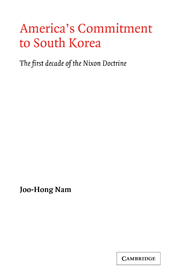Summary
For twenty years after the end of the Second World War, the United States was the only truly global power with the capacity to deploy its armed forces anywhere in the world. The Cold War rhetoric expressing the need to defend ‘the free world’ against the threat from an allegedly monolithic Communist bloc may be seen as an attempt to establish a new pattern of international order. Many of the terms and concepts of that era reflected the concern to consolidate that ‘free world’ and to limit an alleged Communist expansionism. The latter aim involved primarily strategic and military priorities, and the former included the attempt to bolster both the national security and the domestic stability of frequently fragile allied governments. The predominance of American military and economic power meant that America's commitments to its allies were credible because US capabilities largely matched those commitments.
In Northeast Asia, the United States has held the key position in the balance-of-power system since the Korean War of 1950. That war profoundly influenced the pattern of American involvement in Asian affairs in general and in the future of Korea in particular. By intervening militarily to save South Korea from North Korean aggression, the United States established a balance of power against the Communists and set a precedent for future American participation in Asian conflicts. Since then, America's role as the ‘determinant’ of the regional balance has been institutionalized by the presence of sizable US forces in South Korea.
Information
- Type
- Chapter
- Information
- America's Commitment to South KoreaThe First Decade of the Nixon Doctrine, pp. 1 - 8Publisher: Cambridge University PressPrint publication year: 1986
